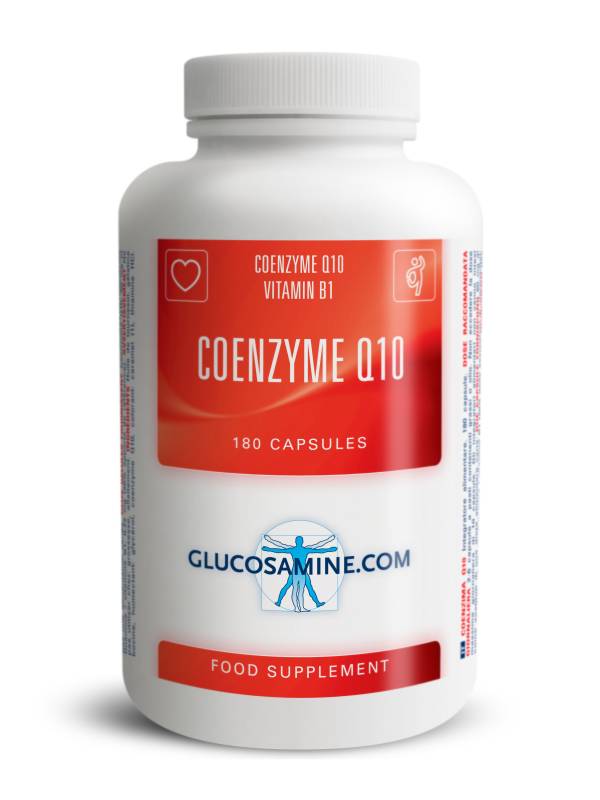This website uses functional cookies. If you click 'Accept', we also use analytical cookies (see our privacy page). If you prefer not to, click 'Decline'.


Almost all foods contain small amounts of coenzyme Q10. Meat is one of the richest sources of this special substance. A kilogram of meat provides about 30 mg of Q10.
Our coenzyme Q10 is a highly concentrated dietary supplement. One capsule contains 30 mg of the coenzyme, just as one kilogram of meat (not of animal origin, however). A dosage of 2 to 6 capsules per day can be taken in order to supplement the Q10 which is present naturally in food.
The human body uses an estimated 3.5 mg of coenzyme Q10 every day. The average daily diet contains about 6 mg of coenzyme Q10. That would seem to be more than enough at first sight. Unfortunately, only about 8% of it is absorbed. This results in about 0.5 mg of Q10 from food which can actually be used.
The body must therefore produce the largest part of the daily requirement of 3.5 mg of Q10 itself. This production depends on age, genes, medicine intake, and proper supply of vitamins and minerals from the diet. If the production is not enough, a supplement can provide a solution. About 1 mg of the 30 mg of Q10 in our softgels is absorbed. One softgel provides 30% of the amount used daily in the human body.
Ask Kris Kuiper, MSc,
exercise physiologist



Coenzyme Q10 for use in supplements can be produced in two ways. One method is synthesis; the other is fermentation. Fermentation ensures that nature-identical Q10 is formed. However, synthesis produces 50% of the normal coenzyme Q10 and 50% of the unnatural 'mirror image' of Q10.
Mirror images of substances can be very unhealthy. They do not belong in the body! There are nevertheless many (cheap) supplements on the market that contain synthetic coenzyme Q10. In this case you might just get what you paid for. Your health is, after all, your most valuable asset.
 We have specifically chosen to use fermented natural coenzyme Q10 in this dietary supplement. This Q10 is manufactured by reputable Japanese producer Kaneka, the inventor of this fermentation process. This supplement is completely free of the synthetic mirror image of coenzyme Q10.
We have specifically chosen to use fermented natural coenzyme Q10 in this dietary supplement. This Q10 is manufactured by reputable Japanese producer Kaneka, the inventor of this fermentation process. This supplement is completely free of the synthetic mirror image of coenzyme Q10.
By choosing our Coenzyme Q10, you are choosing quality. We can guarantee it in the following way:
Natural product. Our Q10 is not synthetic - it is natural. Due to the fermentation process used to produce this supplement, it is free of the unnatural mirror image of Q10, which can be unhealthy.
Safe product. The producer fulfills GMP and HACCP requirements. This means that it follows strict procedures which ensure food safety and hygiene.
Independently tested. The end product is randomly tested for heavy metals and biological pollutants by the independent laboratory NutriControl. Click on the microscope symbol below for the most recent test results. Read more about the independent laboratory tests here.
Specialist since 2000. Glucosamine.com is a specialist in dietary supplements. The company was founded in 2000 by exercise physiologist and human movement scientist Kris Kuiper and has developed several unique supplements since then. Plenty of knowledge and experience is available about the effect and the safety of these supplements.

Coenzyme Q10 is not easily absorbed by the body. Only 8% of coenzyme Q10 is absorbed from food. The absorption from a dietary supplement is even less. It varies from 1% for Q10 in powder form to 3% for Q10 emulsified in oil.
This is an enormous difference, because in the first case three times as much coenzyme Q10 is necessary to achieve the same effect. The powder form, although cheaper, ultimately turns out much more expensive because of the big difference in absorption.
We have chosen to provide coenzyme Q10 emulsified in (sunflower) oil in a softgel capsule, in order to guarantee optimal absorption.





180 capsules (softgels) each containing 30 mg of coenzyme Q10 and 0,22 mg of vitamin B1/thiamine (20% of RDA).
* This is the safe version of caramel, E150a, without additives.
** Vitamin B1/thiamine contributes to normal heart function and a normal energy-generating metabolism.
The coenzyme Q10 used is the ubiquinone form. Read more below about the conscious choice of this form.
Free of gluten, milk, lactose and artificial aromas and colourants.
Recommended daily intake:
We recommend a dosage of 5-6 capsules in any case if taking cholesterol-lowering medicines (statins). A relatively unknown effect of this type of medicines is that they can lower the concentration of Q10 in our cells if taken long term.
Use a maximum of 10 capsules per day.
The capsules may be taken simultaneously or distributed throughout the day.
Magnesium contributes to reduction of tiredness. The supplement Magnesium & Taurine is therefore a perfect complement to coenzyme Q10.
No side effects to coenzyme Q10 are known.
If you are taking medicines or following medical treatment, you must discuss the use of this supplement with a doctor.
Do not take during pregnancy or the breastfeeding period.

Coenzyme Q10 exists as ubiquinone and ubiquinol. The human body converts one form into the other and vice versa. Our Q10 is the well-known ubiquinone form.
There has been much talk about the ubiquinol form recently, which is reportedly better absorbed. Marketeers write mainly about the so-called superiority of ubiquinol. But from a sincere scientist you will learn the following:
